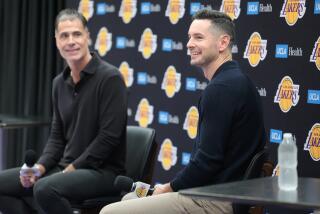‘Showtime’ chronicles glitzy Lakers era of Magic, Kareem and Riley
The diva guard is orchestrating coaching changes. The boss man is an inveterate womanizer, as is most of the team, except for the committed virgin they just signed, who firmly believes sex shouldn’t take place till marriage.
This a dynasty or a soap opera?
Well, actually it’s both. Welcome to Showtime, the run-and-gun Lakers of the 1980s, one of the most successful yet dysfunctional franchises in the history of sports.
What a tonic Jeff Pearlman’s new book is for forlorn Lakers fans suffering through the team’s disastrous current season. Rarely, if ever, has an L.A. team had the star power and sense of fun of owner Jerry Buss’ Showtime Lakers of the ‘80s, when super-fans Jack Nicholson and Dyan Cannon were still babes and the team’s dashing coach looked like the template for every CAA agent in town. Sure, Phil Jackson would later create similar fairy-tale seasons with Kobe Bryant and Shaquille O’Neal. But they felt more second act, less spontaneous, built more on defense and structure.
By comparison, coach Pat Riley’s Showtime was pure jazz, based on the adolescent gusto of Magic Johnson, his often overindulgent teammates and the ringmaster instincts of Buss at the top of his game. Honestly, did the Ming Dynasty have this many moving parts? Certainly not this much cocaine.
Pearlman’s inside story, much of it pulled from previous books and stories but brilliantly woven together in this narrative, is a marvelous and dishy history of the Showtime Lakers, full of bare-knuckled assessments, some of them unpleasant. With a first chapter titled “Jack Kent Kook,” you know you’re in for a rollicking ride.
Pearlman’s talking points, based on 300 first-hand interviews and archival accounts, include:
— Jack Kent Cooke, who sold the team to Buss, was a snarling bully, a “real sicko.”
— The team’s taciturn centerpiece, Kareem Abdul-Jabbar, hated white people.
— Coked-out Spencer Hayward once plotted to have his coach killed.
Then there were the groupies, the orgies and a Forum Club that rivaled Studio 54 for excess and debauchery. Somehow, amid it all, there was some pretty good basketball played as well.
Ex-sportswriter Pearlman, author of five other books including “Sweetness: The Enigmatic Life of Walter Payton,” goes to the very infancy of it all, reenacting how jovial coach Jack McKinney invented what would become known as “Showtime,” an offense based on little dribbling and lots of quick-twitch passing.
After McKinney was disabled in a freak bicycle accident, Paul Westhead took over the team, coached it to the 1980 championship, then promptly fixed everything that didn’t need fixing the next season. Pearlman details how Westhead so bungled the job in his second year that his prodigious young point guard, Johnson, began to work behind the scenes to get Westhead removed.
To fans and observers, it seemed the charismatic star had gone too far.
“[Paul Westhead] was fired by Magic Johnson,” Pearlman writes.
Next up: Pat Riley, a little-known assistant best known at the time as a former Chick Hearn sidekick in the TV booth. He would become Showtime’s crown prince, netting a 73% winning percentage during the decade, best in league history.
The book makes clear that inspiring this talented team took supreme moxie and people skills. It was a diverse set of characters, as would befit an enterprise that married sports with showbiz. Top of the heap, Abdul-Jabbar, who comes off in this book and most reports as both uncommonly bright and uncommonly moody, a persona that amplified Magic’s huge smiles. The talented and temperamental Norm Nixon gets a fair share of the credit for Showtime’s early stages, then some blame, as he bristled over having to hand over point guard duties to Johnson. The tenacious Michael Cooper comes off very well as the glue that held the feuding team together, in the way Derek Fisher would later.
Magic’s amazing arrival at the Lakers is detailed well, especially his huge role in the dynasty’s resurrection. Even if you’ve followed him for decades, the book will give an even more vivid appreciation for the strength of his personality.
Meanwhile, those wondering how the current Lakers ship will ever right itself will be intrigued by the insights in this book. By Pearlman’s account, almost everything seemed to go right in that ancient Lakers era. Most importantly, a poker-loving owner with an eye for talent managed to blend it all with L.A.’s greatest natural resource — pure glitz.
As Riley said at his emotional Lakers departure in 1990, “There is nothing wrong with being unique. [These Lakers] were unique — above and beyond.”
Twitter: @erskinetimes
Showtime
Magic, Kareem, Riley, and the Los Angeles Lakers Dynasty of the 1980s
Jeff Pearlman
Gotham Books: 469 pp., $30
More to Read
Sign up for our Book Club newsletter
Get the latest news, events and more from the Los Angeles Times Book Club, and help us get L.A. reading and talking.
You may occasionally receive promotional content from the Los Angeles Times.







